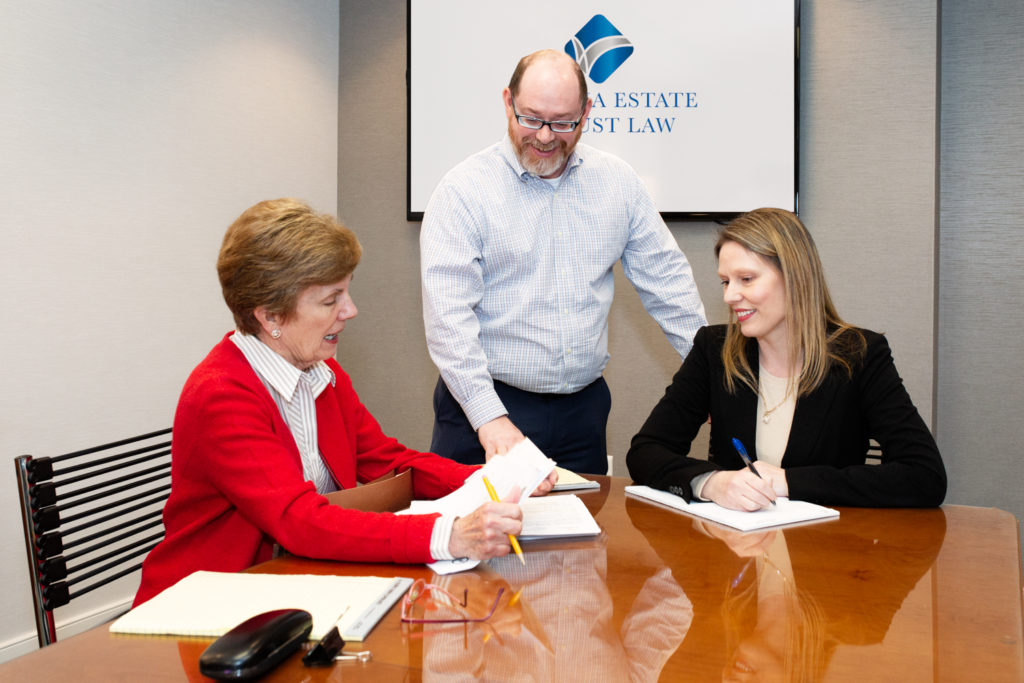
Estate Settlement
Handling an estate after a family member dies can be overwhelming. Let us take some weight off your shoulders.
Following a death, settling an estate can add daunting administrative tasks and deadlines at an emotional time. Our attorneys and staff have years of experience guiding families through estate settlement in a sensitive and expedient manner.

We are able to help as much, or as little, as you need.
Settling an estate can take anywhere from 18 months to 2 years or longer. It involves carrying out a decedent’s wishes, as well as a host of administrative tasks, including paying final bills, arranging to clean out the deceased’s home or properties, handling court filings, tax planning, income and estate tax return filings, making distributions to beneficiaries, and funding trusts.
Often, a family member or friend serving as executor or trustee will turn to us for guidance in carrying out their duties as fiduciary. When the estate is fairly straightforward, we can help these clients navigate the settlement process, while leaving as much of the execution to them as they wish.
Other times, clients may ask us to act as executor and or trustee. In these cases, we serve as a professional fiduciary and handle the entire administration of the estate.
Why appoint Virginia Estate & Trust Law, PLC as executor and trustee?

You will benefit from our expertise and experience.
Regardless of whether an estate can be administered outside of probate, legal requirements of estate settlement are complex and fraught with traps for the inexperienced. Our decades of dealing with the various legal, tax, and administration requirements of estates allows us to deliver efficient resolutions.

We minimize potential family conflict.
Family members who have a stake in the estate may find it difficult, if not impossible, to be objective. Complications can also arise with blended family situations, sibling rivalries, a beneficiary’s challenges managing money, interference from a child’s spouse, and other family dynamics. We are able to serve as a neutral party, free to act in the best interests of all beneficiaries and with the goal of minimizing misunderstandings within the family while meeting estate and tax filing deadlines in a timely manner.

Your family will be relieved of a burdensome responsibility.
The job of administering an estate requires a significant investment of time and a variety of abilities, including excellent organizational and people skills, attention to detail, tax and accounting experience, and accurate record-keeping. Hiring us frees your family from this complex and time-consuming undertaking.

We keep our base fees low.
In most cases, our base estate settlement fee will include all tasks normally provided by a fiduciary in settling an estate, while additional services are billed on an hourly basis. Our fee schedule is structured to avoid having simpler estates subsidize the administration of more complex estates.
Frequently asked questions
I’m not sure how much help I need. Can you help me figure this out?
Absolutely. Settling an estate is a new experience for many of our clients. The first step for all of our clients is to complete the downloadable Estate Settlement Checklist so that we can review the estate assets and documents and determine the best way forward.
Can you handle the whole process for me?
Yes, we can.
How is Virginia Estate and Trust Law appointed as executor?
We can be named in a will as primary or alternate executor.
I am going to be serving as executor. Can you still help?
Definitely. If you decide to administer the estate yourself, we can assist you with tasks like:
- Valuing the decedent’s assets as of the date of death and retitling them as appropriate
- Paying final bills and administration expenses
- Preparing and filing any required inventories and accountings with the proper parties
- Coordinating with the decedent’s personal tax return preparer to file the decedent’s final individual income tax returns
- Preparing and filing an estate tax return when needed and all required income tax returns for the decedent’s estate and/or trust
- Distributing the remaining estate or trust assets to the intended beneficiaries and/or funding trusts
Seeking our support in administering an estate? This is what you can expect whether you are named as executor or our firm is named as executor.

If you are named as executor:
BEFORE you qualify as executor, please reach out to schedule a meeting to:
- Review will and trust agreements
- Review assets owned by decedent
- Review beneficiary designations
By meeting with us early, we can help you:
- Avoid missteps
- Streamline estate administration
- Form an estate administration task list
- Optimize tax benefits
We can do as many or few administration tasks as you choose.

If Virginia Estate and Trust Law is named as executor:
We take responsibility for all tasks:
- We coordinate with decedent’s other professional advisors
- We serve all beneficiaries’ interests impartially
Interested in working with us?
Reach out to learn how we can help you reach your specific goals. Our objective is always to provide the just-right amount of support to meet your needs.



